- Home
- Barry Eisler
The God's Eye View Page 2
The God's Eye View Read online
Page 2
She’d been sitting for close to twenty minutes, and was just thinking maybe she should have stopped at the restroom before coming and that she definitely should have thrown on a sweater because as usual the outer office was freezing, when Remar paused in his typing, glanced over from his monitor, and said, “You can go in now.”
She always wondered how the director signaled him. Some kind of text message, presumably, the same way Remar had alerted the director she was waiting. That, or they’d become psychic, working together so closely for so long. She stood, hesitated for just a second, and opened the door.
The director was sitting behind his L-shaped wooden desk. The wall to his left was festooned with photographs of various luminaries—presidents, prime ministers, generals, captains of industry—all shoulder to shoulder with the director or shaking his hand. The wall to his right was devoted to bookcases filled with serious-looking tomes on military strategy, business management, and philosophy. In one corner was a coffee table, a couch, and two upholstered chairs—the space for longer and perhaps more casual meetings, though she had never been invited to join the director there.
She closed the door behind her and stood silently while he scribbled notes in the margins of some papers. After a moment he glanced at her over his reading glasses, his eyebrows arching at . . . what? Was he annoyed at the intrusion? Did he welcome it? As usual, she found him impossible to read. He was a slight man of about sixty, with thinning hair and sallow skin. She’d been working with him for over a year, and had yet to see him display any real emotion beyond a periodic intense narrowing of his pale blue eyes. She’d never even caught him ogling her breasts, which had gone from a C to a D when Dash had been born and then decided to stay put even after she’d gotten back to exercising and lost her pregnancy weight. She didn’t mind the extra size—in fact, as a single mother, she welcomed the attention brought by her new dimensions—but the director’s failure ever to even sneak a glance was a little weird. Was he gay? She knew he was married, with four grown daughters, but that was no guarantee; even in the twenty-first century there were plenty of closeted people in the military, especially among the higher-ups. She’d wondered from time to time what he would do if she ever showed up with an extra button undone and leaned across his desk to point something out . . . would he be unable to resist a look? But she’d never tried. He wasn’t the kind of man you’d want thinking you were messing with him.
He gestured to one of the chairs in front of his desk and said, “What is it?” The question was a kind of challenge, a suggestion that if she was taking advantage of the direct access, of course she would have something important to bring to his attention. That she’d better have something important.
She sat, her feet pressed firmly against the carpet. Like the waiting area, his office was over-air-conditioned, but she could feel a slight slick of perspiration under her arms and was glad she’d worn deodorant.
“Sir, my system threw up a flag—a match for two faces on the watch list. A reporter with the Intercept named Ryan Hamilton. And the SUSLA in Ankara. Daniel Perkins.”
The Special US Liaison Advisor was NSA’s senior representative in Turkey, reporting directly to the director. There were only five others in the world—in Germany, Italy, Thailand, Japan, and Korea. If a SUSLA had gone rogue, it was a major breach, and she watched the director closely, curious about his reaction.
But there was nothing beyond that slight narrowing of the eyes. “What did you observe?”
“Well, as you know, sir, we’re tapped into CCTV networks all over the world. The feeds run through a facial recognition system and a Convolutional Neural Network analyzing other biometrics like height, stride length, and walking speed, and when certain people are observed together, the system sends out an alert. There are a lot of false positives that have to be screened out, but this one is confirmed. I’m pretty sure Hamilton and Perkins met in Istanbul.”
The director’s expression was so impassive it looked momentarily as masklike as Remar’s burned profile.
“You have them face-to-face?”
“No, sir, not face-to-face. But I’m pretty sure I know where they met—a Bosphorus commuter ferry. I was able to go back and track them taking separate routes, though there’s no camera on the ferry itself.”
The director leaned back in his chair, the casualness of the pose, like his initial What is it? question, a kind of challenge. “How do you know it’s not a coincidence?”
“Well, sir, I can’t prove it’s not. But the ferry feels like tradecraft to me. And you told me to err on the side of inclusiveness, especially when one of the principals is NSA.”
If her statement came across like an admonition, he did nothing to show it. “When did this possible meeting occur?”
“Two hours ago.”
“And they’re still in Istanbul?”
“Presumably. I’m guessing . . .” She paused, thinking better of it.
“Yes?”
“Well, I know that as SUSLA Turkey, Perkins is your direct report. I’m guessing . . . you didn’t know he’s in Istanbul.”
The director raised his eyebrows. “Why do you guess that?”
“Because of the way you just asked if they were still there, sir. If Perkins were traveling on official business, I’d guess you would know.”
The director looked at her silently, and she wondered whether she had said too much. But she wanted him to know she could do more than just hack networks and create monitoring systems. She wanted him to know she had good instincts, too, and that she deserved more responsibility.
“Anyway,” she went on, “I’d recommend checking customs records to determine when Hamilton arrived, and I’d look at their mobile phones, too. If the phones were turned off, or left behind somewhere else, it sure would look as though they’re trying not to be tracked. XKeyscore could tell us a lot, too. I would have looked into it myself, sir, but I’m not authorized.”
It was a subtle hint that she could do her job better, more efficiently, if she had more tools.
But he ignored it. “That’s good thinking. Send me the raw data. I want to know exactly where and at what time they were picked up by the cameras.”
“Yes, sir.”
He removed the reading glasses and placed them on his desk, then looked at her closely. “Tell me, Evie, you designed the camera system, didn’t you?”
She blinked, surprised he had used her name. Surprised he remembered it.
“Uh, yes, sir. Well, I mean, we already knew that these days most CCTV cameras are wired into networks, meaning remotely exploitable by us.”
“Yes, but you were the one who led the team that got us into the networks and tied them together. You were the one who automated the system, exploiting new networks as they went online, like that one Harvard secretly installed in its classrooms ostensibly as part of a study on attendance at lectures. You were the one who proposed using the access not just for directed tasking, but for passive surveillance, too, by tying it all together with the facial recognition technology and the Convolutional Neural Network.”
“That’s correct, sir.”
He nodded. “If this Perkins thing does turn out to be a breach, it’s exactly the kind of problem we would have overlooked if it hadn’t been for you. Very good work.”
She recognized she was being dismissed. If she was going to bring up what had been bothering her, it was now or never.
Just do it, she thought. Or it’s never going to stop bugging you.
“Sir, can I . . . there’s one other thing I wanted to ask about, if that’s all right.”
He raised his eyebrows and said nothing.
“Sir, remember last month, the CIA sysadmin I discovered was in contact with Marcy Wheeler, the journalist at Emptywheel?”
“Scott Stiles, of course.”
“Yes, Stiles. Well, as usual, all I can do is confirm by access to the network that a meeting took place. I’m not supposed to otherwise task anything. So . .
. I never know what the follow-up reveals.”
She waited, hoping again that maybe he would take the hint, agree that she could do her job better without the blinders. But he said nothing. Just that unnervingly neutral expression and the penetrating stare. She almost decided to drop it. But she’d come this far. The hell with it.
“So, well, just a few days after I flagged the Stiles/Wheeler connection, I came across a news item in the Post. Stiles had been found hanged in his McLean apartment.”
“Yes, I’m aware of it. Very sad.”
“Yes, sir, it was. And I was just . . .”
She couldn’t finish the sentence. What the hell was she doing?
The director offered her the trace of a smile. “Are you asking, was that a coincidence?”
“Uh, well, yes, sir, I guess that is what I’m asking. It just seemed—”
“You want to know whether we had anything to do with Stiles’s death.”
She swallowed. She couldn’t deny that, yes, that was precisely what she wanted to know. But she couldn’t say it out loud, either. Even just having suggested it seemed suddenly crazy. The idea itself, and mentioning it besides.
A silent moment spun out. Then the director chuckled. “The answer is no.”
She looked at him, but his gaze was inscrutable. After another awkward, silent moment, she nodded and stood. “Thank you, sir. I . . . I feel silly that I asked.”
He shook his head. “I’m glad you asked. It’s exactly the kind of question, the kind of connection, each of us should be trying to make. It just happens that in this case, the connection was a coincidence.”
“So . . . Stiles wasn’t involved with anything . . . untoward with Marcy Wheeler?”
There was a pause. “I didn’t say that.”
“No, sir, but you said Stiles’s death was sad.”
There was the slightest furrowing of his brows. “As it was. Whatever he may or may not have intended in his contacts with irresponsible bloggers, he served his country for many years. By my lights, that makes his unfortunate, unnecessary, and untimely death very sad indeed, as I said.”
She nodded and stood, recognizing she had hit a dead end and wishing she hadn’t gone down the street that led to it. When she got to the door, he said, “Evie.”
She turned and looked at him.
He nodded as though in appreciation, or appraisal. “Very good work.”
“Thank you, sir.”
She headed back to her office, mentally kicking herself. She’d felt she had to ask, but why? What point had she been trying to prove, and to whom? If she’d been watching a movie, she’d be angry at the heroine for having thoughtlessly tipped her hand. She’d learned nothing, and in doing so had probably caused the director to question . . . she didn’t know what. Her loyalty, or something.
All of which was bad enough. But there was something worse, something she sensed was the real reason she wished she hadn’t asked about Stiles.
She thought the director was lying.
CHAPTER . . . . . . . .
. . . . . . . . 2
The moment Gallagher left, Anders was on the phone scrambling the geolocation and customs records units. Gallagher had good instincts, which worried him somewhat at the moment, but he would deal with that presently. For now, what mattered was Hamilton and Perkins, and whether NSA had a new Snowden operating out of Turkey.
He decided not to contact anyone in Ankara. Not yet. He expected he would be able to find out all he needed from the geolocation and customs records people. And from a system set up by a computer network exploitation unit, one that had penetrated just about every hotel and other travel system in the world. If Perkins needed to be dealt with, it was better that as few people as possible knew of the underlying problem, especially with Gallagher expressing suspicions about what had happened to Stiles. The whole purpose of the compartmentalized security program—cell phone geolocation, customs, law enforcement, CCTV monitoring, satellite imagery, license plate reading, and several others, in addition to the more widely available and less walled-off metadata programs—was to ensure that no one without the appropriate clearance would have more than the most fragmented sense of who was being looked at, or why. Or what was being done about it.
Well, not the whole purpose. There was another benefit: no one but Remar and Anders himself understood all the means of monitoring NSA could bring to bear on a problem. He had a gut-level feeling it was precisely this compartmentalization, which he himself had designed following the Snowden breach, that had tripped up Perkins. If Perkins had gone traitor, the man would have known to be ultracautious about his cell phone, the sites he visited online, and a variety of other security tells. But Perkins didn’t know about the facial recognition or other biometrics analysis. A mole could only avoid and evade the monitoring systems of which he was aware. Which made it crucial that almost no one be permitted to see the whole picture.
Within ten minutes, he’d received confirmation that Hamilton had arrived that afternoon on a BA flight from London. He had checked in at the Rasha Hotel two hours after that. And his cell phone had remained at the hotel since then. Why would a reporter leave his cell phone in his hotel room while he was out, if not as an attempt to fool anyone tracking him into believing he, too, had remained in his room? And worse, Perkins had done the same: his cell phone left in his Ankara apartment while Perkins was traveling in Istanbul.
And Gallagher had been right. It was unthinkable Perkins would travel to Istanbul without first informing Anders. Snowden slipping off to Hong Kong had been what had killed them in 2013. Since then, all travel, like all foreign and media contacts, had to be strictly accounted for in advance. That Perkins had violated the protocol looked bad. Very bad. But Anders needed more to be certain—certain enough to do what he sensed was going to be required.
He called Gallagher. “Evie, how many camera networks are you into in Ankara and Istanbul?”
“Virtually all of them, sir. There are a few banks with especially heavily encrypted systems, but—”
“And the footage is stored for how long—three months?”
“At least, sir. If necessary, we can often retrieve earlier material that’s been overwritten.”
“I want you to run your system and see if you can place Perkins in or around Ankara Internet cafés over whatever time frame is available to you.”
“Sir, I think if you focus on his mobile phone—”
“I sincerely doubt he would have had it with him during the visits I’m imagining.”
There was a pause. “Understood, sir.”
“If you find anything, I want the dates, times, and locations.”
“Yes, sir.”
He clicked off and considered. Why would Hamilton and Perkins risk meeting face-to-face? If this were a simple leak of documents, no matter how massive, it could all have been handled remotely. Electronically.
But that was the answer right there, wasn’t it? Signals intelligence was NSA’s bread and butter. Perkins knew that. So he was more afraid of an electronic intercept than he was of being compromised through a meeting. It was the same reasoning bin Laden had employed in eschewing phones and the Internet and relying on human couriers, instead.
But he sensed there was more than simply that. Maybe they didn’t just need to meet face-to-face; they wanted to. Why? He thought of Snowden again. The material Snowden had leaked was recondite, practically a foreign language to outsiders. He’d spent a week walking Greenwald, Poitras, and MacAskill through it, providing background, explanations, crucial context. If all Perkins wanted was a leak, he could have just uploaded his information to WikiLeaks. No, what he wanted was a known journalist’s imprimatur—a way of laundering a leak into something newsworthy. Otherwise, the damage control would be too easy. The government could dismiss the revelations as vandalism, or deny them entirely.
A message alert popped up on his monitor. Gallagher had come through. Perkins favored at least four Internet cafés in Ankara. Pres
umably there were others, involving a kind of shell-game effect, but he’d been picked up only at the four so far. Still, that was more than enough.
He called a PRISM analyst and told her he wanted to know if any of the Internet activity at the Ankara cafés in question was suspicious. With the dates and times, it took less than three minutes for the analyst to confirm that someone was using those cafés to read the Intercept and WikiLeaks and various other radical websites. Worse, that someone was focusing on the bios of activists that read like a who’s-who of international subversives: Barrett Brown, Sarah Harrison, Murtaza Hussain, Angela Keaton, that FOIA terrorist Jason Leopold, Janet Reitman, Trevor Timm . . . and that damn Marcy Wheeler again. With the attention gradually narrowing to one name in particular: Ryan Hamilton.
The beauty of the security system was that the analyst had no idea who was being tasked. She would never connect Anders’s query today with the unpleasant news about Perkins tomorrow.
A call to a geolocation analyst confirmed that on each occasion Perkins had been using an Internet café, his mobile phone had remained in his apartment. He thought doing so would disguise his movements, and therefore his activity. And he would have been right—except for the camera network. He didn’t know about that.
For a moment, Anders was irritated at all the trouble he had to go through just to confirm a single person’s location. It would be so much easier, and better, if everyone were fitted with a microchip. He’d read an article somewhere about how a dog had slipped away from its home in Pennsylvania, and how it had been discovered months later in Oregon—all because a shelter technician had read the microchip her owners had implanted in her. There might be some resistance to the notion of doing something like this to people, of course, but he imagined if it were billed as insurance against kidnapping . . . and if a high-profile kidnapping could be arranged to be foiled—a child saved from the worst depravity, its parents from bottomless horror and grief, solely because the child’s loving parents had possessed the foresight to implant a chip while the child was an infant—it wouldn’t be long before all parents would feel criminally negligent for failing to implant their children. He wondered if a law could be passed, the way there had been for car seats and bicycle helmets. But no, it probably wouldn’t even be necessary. The fear of a kidnapping coupled with a Why, why did we not have the microchip done? would be more than sufficient.

 All the Devils
All the Devils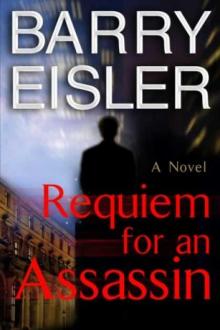 Requiem for an Assassin
Requiem for an Assassin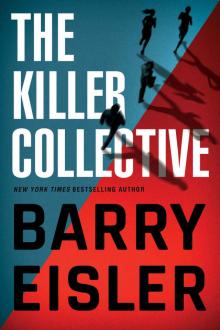 The Killer Collective
The Killer Collective The Chaos Kind
The Chaos Kind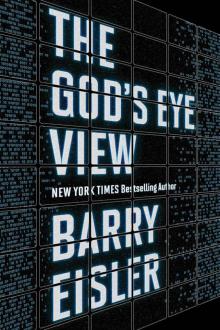 The God's Eye View
The God's Eye View Paris is a Bitch
Paris is a Bitch The Khmer Kill: A Dox Short Story (Kindle Single)
The Khmer Kill: A Dox Short Story (Kindle Single) The Last Assassin
The Last Assassin The Detachment
The Detachment The Night Trade (A Livia Lone Novel Book 2)
The Night Trade (A Livia Lone Novel Book 2)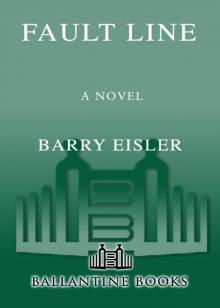 Fault Line
Fault Line Hard Rain
Hard Rain The Khmer Kill_A Dox Short Story
The Khmer Kill_A Dox Short Story London Twist: A Delilah Novella
London Twist: A Delilah Novella The Lost Coast
The Lost Coast Rain Fall
Rain Fall Zero Sum
Zero Sum Killing Rain
Killing Rain John Rain 08: Graveyard of Memories
John Rain 08: Graveyard of Memories A Clean Kill in Tokyo (previously published as Rain Fall)
A Clean Kill in Tokyo (previously published as Rain Fall) Inside Out: A novel
Inside Out: A novel John Rain 07 - The Detachment
John Rain 07 - The Detachment Graveyard of Memories
Graveyard of Memories The Lost Coast -- A Larison Short Story
The Lost Coast -- A Larison Short Story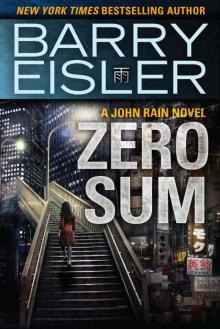 Zero Sum (A John Rain Novel)
Zero Sum (A John Rain Novel)